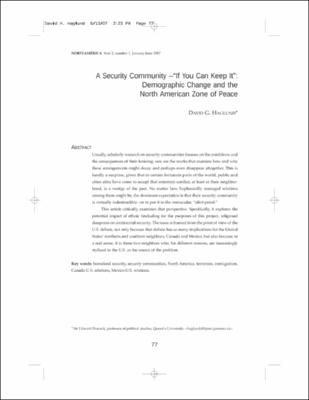Mostrar el registro sencillo del ítem
A Security Community –“If You Can Keep It”: Demographic Change and the North American Zone of Peace
| dc.rights.license | http://ru.micisan.unam.mx/page/terminos | |
| dc.contributor.other | Maldonado Rivera, Silvia | |
| dc.creator | Haglund, David G. | |
| dc.date.accessioned | 2019-04-10T15:33:53Z | |
| dc.date.accessioned | 2022-02-16T23:39:57Z | |
| dc.date.available | 2018-12-14T00:18:28Z | |
| dc.date.available | 2022-02-16T23:39:57Z | |
| dc.identifier.issn | 1870-3550 | |
| dc.identifier.uri | https://ru.micisan.unam.mx/handle/123456789/19890 | |
| dc.format | application/pdf | |
| dc.format.extent | pp. 77-100 | |
| dc.language.iso | eng | |
| dc.publisher | Universidad Nacional Autónoma de México, Centro de Investigaciones sobre América del Norte | |
| dc.relation.isformatof | ||
| dc.relation.ispartof | Norteamérica: Revista Académica del CISAN-UNAM | |
| dc.relation.requires | Adobe Acrobat | |
| dc.subject | CIENCIAS SOCIALES | |
| dc.subject.lcsh | Political science | |
| dc.subject.lcsh | International relations | |
| dc.title | A Security Community –“If You Can Keep It”: Demographic Change and the North American Zone of Peace | |
| dc.audience | Investigadores | |
| dc.audience | Maestros | |
| dc.audience | Estudiantes | |
| dc.audience | Medios de comunicación | |
| dc.coverage.placeofpublication | México | |
| dc.description.abstracteng | Usually, scholarly research on security communities focuses on the conditions and the consequences of their forming; rare are the works that examine how and why these arrangements might decay and perhaps even disappear altogether. This is hardly a surprise given that in certain fortunate parts of the worldpublic and elites alike have come to accept that interstate conflict at least in their neighborhood is a vestige of the past. No matter how haphazardly managed relations among them might be the dominant expectation is that their security community is virtually indestructible –or to put it in the vernacular “idiot-proof.” This article critically examines that perspective. Specifically it explores the potential impact of ethnic (including for the purposes of this project religious) diasporas on continental security. The issue is framed from the point of view of the U.S. debate not only because that debate has so many implications for the United States’ northern and southern neighbors Canada and Mexico but also because in a real sense it is those two neighbors who for different reasons are increasingly stylized in the U.S. as the source of the problem. | |
| dc.educationlevel | Superior | |
| dc.educationlevel | Posgrado | |
| dc.identifier.cisan | N_2007_0002_0001_0077 | |
| dc.identifier.conacyt | CONACYT | |
| dc.identifier.eissn | 2448-7228 | |
| dc.relation.issue | 1, enero-junio | |
| dc.relation.volume | 2 | |
| dc.rights.accesslevel | openAccess | |
| dc.rights.creativecommons | http://creativecommons.org/licenses/by-nc-nd/4.0 | |
| dc.source.isbn | 1870-3550 | |
| dc.subject.conacyt | 5 | |
| dc.subject.keywordseng | homeland security | |
| dc.subject.keywordseng | security communities | |
| dc.subject.keywordseng | North America | |
| dc.subject.keywordseng | terrorism | |
| dc.subject.keywordseng | immigration | |
| dc.subject.keywordseng | Canada-U.S. relations | |
| dc.subject.keywordseng | Mexico-U.S. relations | |
| dc.subject.keywordsspa | seguridad nacional | |
| dc.subject.keywordsspa | comunidades de seguridad | |
| dc.subject.keywordsspa | Norteamérica | |
| dc.subject.keywordsspa | terrorismo | |
| dc.subject.keywordsspa | inmigración | |
| dc.subject.keywordsspa | relaciones Canadá-Estados Unidos | |
| dc.subject.keywordsspa | relaciones México-Estados Unidos | |
| dc.subject.unam | Ciencia política | |
| dc.subject.unam | Relaciones internacionales | |
| dc.type.spa | article | |
| dc.view.accesslevel | DISPONIBLE | |
| dc.date.copyrighted | [ca. 2007] |
Ficheros en el ítem
Este ítem aparece en la(s) siguiente(s) colección(ones)
-
Artículos [469]
MiCISAN, Repositorio Institucional
Hecho en México, todos los derechos reservados 2018. Esta página puede ser reproducida con fines no lucrativos, siempre y cuando no se mutile, se cite la fuente completa y su dirección electrónica. De otra forma, requiere permiso previo por escrito de la institución.
Sitio Web administrado por: Centro de Investigaciones sobre América del Norte • micisan@unam.mx








